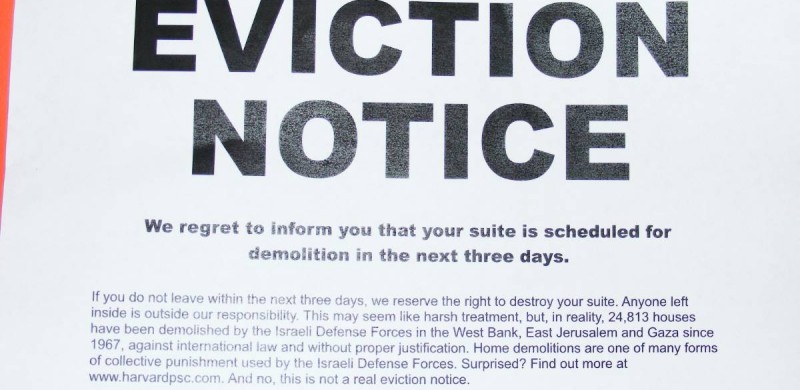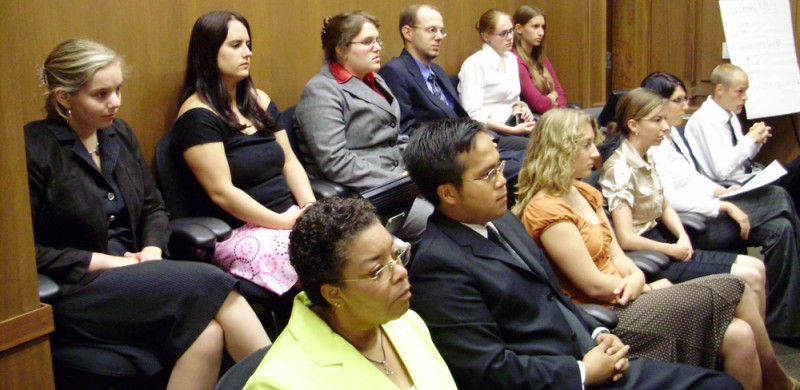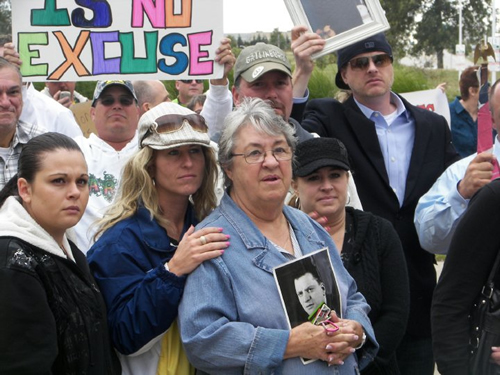
Nov 26, 2014 | Michigan Medical Marijuana Act
Shannon Sterner evicted for using medical marijuana as a patient under the Michigan Medical Marijuana Act
By Michael Komorn
Leoni Township resident, Shannon Sterner, is 25-years-old, and living with pain.
She has tried medications to manage the effects of fibromyalgia and reactive arthritis brought on by an infection–none of which have worked. But for the last nine months she has tried a something new to alleviate the discomfort she experiences as a result of her conditions: marijuana. But just when Sterner believed she had found something to help her live in peace and free of pain, she was evicted from her federally subsidized apartment for using a drug permitted under Michigan’s medical marijuana law.
“They said I violated my lease for having an illegal substance,” said Sterner, who was ordered to vacate her home at Ridgewood Vista Apartments. “For me, I was under the assumption it was legal and I didn’t do anything wrong.”
This incident highlights a sea of confusion with the 2008 Michigan law, in particular, as it relates to conflicts with the federal government which considers marijuana an illegal drug.
Sterner and her attorney, Michigan Medical Marijuana Association President Michael Komorn, contend that she was not breaking the law. However, housing complex managers argue they must comply with federal rules to continue to provide federally subsidized housing.
Gary Offenbacher, executive vice president of Bingham Farms-based Continental Management, which owns Ridgewood Vista, said tenants must keep their homes free of illegal drugs after signing a lease.
Offenbacher claimed Sterner’s neighbors had complained about smelling marijuana. The Jackson Narcotics Enforcement Team responded to her apartment at 5340 Ridgewood Vista Drive on July 28 and seized five marijuana plants from the back porch, said Michigan State Police Detective Lt. Dave Cook, who leads JNET. The case is pending review from the county prosecutor, Cook said.
Sterner denies growing the plants on her porch and was not arrested.
Offenbacher said the housing complex was forced to act.
“I can’t dispute her legal use within the state, but there are certain agreements tenants make when they live on federally subsidized property. She was not abiding by that,” Offenbacher said. “The federal government holds us to different standards.”
District Judge Michael Klaeren rules in the housing complex’s favor in December in a legal dispute over the eviction.
“It’s distressing because Shannon is sick,” said Komorn, who is considering an appeal. “She is being singled out for her choice of how she wants to treat her medical condition. She was doing nothing wrong.”
Under state law, a patient can have 2.5 ounces of marijuana. If they do not have a specified caregiver, patients can keep 12 plants in an enclosed, locked facility, according to the law.
Federal law does requires housing complexes that receive subsidies to have lease provisions that enabling the eviction of tenants for using illegal drugs, such as marijuana. However, are able to use discretion, according to the U.S. Department of Housing and Urban Development.
“While there is a requirement that (public housing agencies) and landlords have lease provisions that give them the right to evict, the decision is theirs and theirs alone,” HUD spokeswoman Laura Feldman said in an e-mail.
Sterner grew up in foster care and has no family to stay with locally. Her best hope was that friends would take her and her two children in, but she did not know where she would go next.
She offered to stop using medical marijuana and return to traditional methods of pain management if she could keep her apartment.
“I’m trying not to lose my normal life,” she said.
If you or someone you know is facing charges as a result of Medical Marijuana prescribed to you as a Medical Marijuana patient under the Michigan Medical Marijuana Act, contact Komorn Law and ensure your rights are protected.
Michael Komorn is recognized as a leading expert on the Michigan Medical Marihuana Act. He is the President of the Michigan Medical Marijuana Association (MMMA), a nonprofit patient advocacy group with over 26,000 members, which advocates for medical marijuana patients, and caregiver rights. Michael is also the host of Planet Green Trees Radio, a marijuana reform based show, which is broadcast every Thursday night 8-10 pm EST. Follow Komorn on Twitter.
Read more: http://www.mlive.com/news/jackson/index.ssf/2011/01/woman_evicted_from_federally_s.html

Nov 25, 2014 | Criminal Defense Attorney Michael Komorn, Michigan Medical Marijuana Act, Planet Green Trees Radio
A jury trial is fundamental to our democratic system of government. Every American citizen should embrace this responsibility by participating, and ensure justice prevails.
by Michael Komorn
I just picked a jury in a marihuana case, there were several perspective jurors who were excused, who will not sit on our jury because of the answers they gave during the jury voir dire. This is not the first time this has happened.
If you believe in medical cannabis, and or that Marijuana should be legal and you find yourself on a jury in a marihuana case here are some things to remember:
During the Jury Selection, you will be asked if you can put your personal or philosophical feelings aside, and be fair to both the prosecutor and the defense.
During the Jury Selection, you will be asked if despite your beliefs you will follow the law as it is given to you, and apply the facts to the law when you deliberate.
These are common question asked during the jury selection also known as voir dire, with the overall goal of the process to select persons who will put aside there personal beliefs, as the Judge will direct , and render a just verdict.
The same questions are asked to prospective Jurors, who have family members or relatives who are police officers, ie Madam juror despite being married to the Chief of police for 25 years and despite the fact that your husband is a police officer, will you be able to put that fact aside and be fair to the defendant in this case.
10 out of 10 times the answer of the Police Chief’s wife will be yes. I can follow the law, and will follow the instructions that the Court gives me.
Please note that the Police Chiefs wife’s answer allows her to stay on the jury.
Unfortunately as we saw today, from the many prospective jurors who were asked if they could be fair in our case involving marihuana, the answer ” no, I could not be fair because I could never convict someone of a marihuana charge” had them removed for “cause”, and they did not even have a chance to sit and judge the case.
Or said another way the ideal person who should be on our jury will not be. As they were excused from the jury box, and exited the court room, I could not help but think to myself, that I bet they really could be fair in this case, that they really could follow the law as the Court instructed them, that they could apply the law to the facts of the case, and also put aside whatever beliefs they had about marihuana to render a just verdict.
We all have biases, beliefs and preconceived ideas of the world, anyone who participates in the jury process is asked to put those feelings aside, and listen to the specific facts of the specific case, which will not come until after the jury has been selected. Those who are against marijuana prohibition should be more open minded and objective in their answers, just as any other perspective juror would be.
Unfortunately the answer “I could never convict a person for marihuana because it should be legal” actually has a serious and negative effect on the fairness of the trial. ”
If the wife of the Police Chief can sit on the jury, and put aside the stories she has heard at dinner every night for her entire marriage, then so can those who oppose marihuana prohibition. If she can follow the law, be fair and render a fair verdict, then so can those who oppose marihuana prohibition. The distinction here is in the semantics and the desire to render a just verdict by participating in the jury trial process. The issue is not what you believe but whether you can be fair. Being fair means listening to the evidence and rendering a just verdict. So to all of you, who believe in ending marihuana prohibition, remember there is a time and place for that discussion, and it is not during a jury selection. Despite your convictions, remember being on a jury is the quintessential American experience, embrace it, be one with it, put your beliefs of the world aside, and tell the court you can be fair. Your roll in all this chaos will be better served having you sit and be that juror who can render justice.
If you or someone you know is facing charges as a result of Medical Marijuana prescribed to you as a Medical Marijuana patient under the Michigan Medical Marijuana Act, contact Komorn Law and ensure your rights are protected.
Michael Komorn is recognized as a leading expert on the Michigan Medical Marihuana Act. He is the President of the Michigan Medical Marijuana Association (MMMA), a nonprofit patient advocacy group with over 26,000 members, which advocates for medical marijuana patients, and caregiver rights. Michael is also the host of Planet Green Trees Radio, a marijuana reform based show, which is broadcast every Thursday night 8-10 pm EST. Follow Komorn on Twitter.

Nov 25, 2014 | Medical Marijuana Attorney Michael Komorn, Michigan Medical Marijuana Act
This seventy-year-old grandmother and former Lake Orion police dispatcher was denied the right to present a medical marijuana defense in her criminal trial.
By Michael Komorn
Mrs. Barbara Argo, a 70-year-old grandmother and former Lake Orion police dispatcher is appealing her recent drug conviction. Mrs. Argo was convicted in June of one count of delivery/manufacture of marijuana, a four-year felony. In July, she appealed the conviction.
Grounds for the appeal are based on a motion Oakland Circuit Judge Wendy Potts granted prosecutors that prevented Argo or her attorney from using the words “medical marijuana,” “patient,” “caregiver,” or any reference of the fact that Argo was legally allowed by the state to cultivate and possess the plants.
“We believe that Mrs. Agro was denied her constitutional right to present a defense.
She was a registered patient with the State of Michigan, as well as being a registered caregiver, which falls under the protections of the Medical Marihuana Act,” Attorney Mary Chartier told The Daily Tribune.
This legal sidestep is one being used at an exponentially increasing pace by prosecutors throughout the state.
Jeffrey Ellis, a medical marijuana caregiver in Livonia says he was in compliance with the law when he was raided in 2009 and is immune to arrest and prosecution, but during a September 26 hearing in Huron County Circuit Court, Chief Assistant Prosecutor Dawn A. Schumacher asked the judge to prevent the jury from knowing Ellis was a legal patient and caregiver.
According to Schumacher, Ellis was in violation of the law by having too many plants and did not have the required lock on the door to the growing area. She argued those violations ought to prevent Ellis’ immunity to prosecution.
However, Ellis’ attorney and President of the Michigan Medical Marijuana Association, Michael Komorn, says that police actually confiscated marijuana clippings, not actual plants and that Ellis had not exceeded the number of plants permitted by state law.
“The courts are given the task of ensuring a fair trial,” Komorn says, “and for the first time in my 18 years of practicing law, we’re seeing the constitutional right to present a defense ignored and intentionally circumvented.”
“Prosecutors and law enforcers are working to deny our most sacred right in the constitution, and that is to present a defense. They fight hard to not let the people of the community hear the facts, and make the legal and factual decisions themselves.”
“The ultimate decider of truth in the criminal justice system is the jury, that’s how it’s always been.”” Komorn told TMC. “They decide if the person is guilty or not. You have two sides, the prosecutor and the defense attorney and they’re at odds. The person charged with the crimes presents their defense to the jury and the jury decides if they’re guilty or not.
“You can believe they had a horrible time seating that jury,” Mrs. Agro told TMC.
“One person after another told the judge and prosecutor that they didn’t see anything wrong with marijuana and would not be impartial on the jury. It took them a long time to find the people who would find me guilty, but they did.
Mrs. Argo claims that three separate jurors asked Judge Potts during the trial if she was a patient, and Potts told them she couldn’t answer that question because it wasn’t relevant to the trial.
Mrs. Argo and her husband Sal, became certified medical marijuana patients in June 2010. Mrs. Argo for her acute arthritis in her hands and knees, and Mr. Argo for bone spurs in each of his shoulders which limited range of motion. “He couldn’t even lift his hands above his waist,” Mrs. Agro reports.
The paramilitary Oakland County Narcotics Enforcement Team raided the Argo home last August, in conjunction with a sweep of medical marijuana homes and businesses. Mrs. Agro says that during the raid, “mattresses were ripped apart, cabinets were emptied, and our plants were ripped from their pots and dirt thrown across rooms and even into our bed. Approximately $11, 270 dollars was taken for our home, money that had been saved and withdrawn to purchase a vehicle.”
Sal Argo received a call to inform him that his son’s house (with grandchildren present) was being raided, so he quickly left the house to check on his family, leaving the front door unlocked. The prosecutor claims that their unlocked house failed to meet the requirements of an “enclosed locked facility,” and did not qualify for the medical marijuana defense.
Sal Argo was also charged, but died shortly thereafter of a heart attack.
Assistant Prosecutor Beth hand instructed jurors to, “follow the law and not use sympathy,” when weighing her fate.
Assistant Prosecutor Beth Hand, after successfully arguing to prevent the jury from knowing Agro was legally allowed by Michigan law to cultivate and possess the plants, instructed jurors to, “follow the law and not use sympathy,” when weighing her fate.
“You must hold the defendant accountable for her actions,” Hand instructed the jurors during her closing argument.
Mrs. Agro was sentenced to 90 days of probation on July 13 and Potts ordered her to perform 20 hours of community service, which Agro has already completed.
If you or someone you know is facing charges as a result of Medical Marijuana prescribed to you as a Medical Marijuana patient under the Michigan Medical Marijuana Act, contact Komorn Law and ensure your rights are protected.
Michael Komorn is recognized as a leading expert on the Michigan Medical Marihuana Act. He is the President of the Michigan Medical Marijuana Association (MMMA), a nonprofit patient advocacy group with over 26,000 members, which advocates for medical marijuana patients, and caregiver rights. Michael is also the host of Planet Green Trees Radio, a marijuana reform based show, which is broadcast every Thursday night 8-10 pm EST. Follow Komorn on Twitter.

Nov 25, 2014 | Legalization, Michigan Medical Marijuana Act
State-registered user and Detroit attorney, Matt Abel, is one of the primary organizers of the petition campaign to be on the statewide November ballot with a proposal allowing Michiganders 21 and older to possess small amounts of marijuana.
(Not long ago, in 2008, Michigan Voters approved the state act to allow medical marijuana use with an overwhelming 63% votes.)
A continued restriction of access to medical marijuana has Michigan’s registered patients, supporters and lawyer heading in a new direction: a campaign to approve limited legalization of marijuana in Michigan for all uses.
Patients are growing tired of tightened access to the medical marijuana as a result of doctors refusing to sign the state forms to approve the state forms to approve the drug. Worse, dozens of communities — including Birmingham and Livonia — are enforcing total bans on the drug, while dispensaries that openly sold it for medicinal purposes have been raided and shut down by the police.
(Related: Planet Green Trees Radio)
State-registered user and Detroit attorney, Matt Abel, is one of the primary organizers of the petition campaign to be on the statewide November ballot with a proposal allowing Michiganders 21 and older to possess small amounts of marijuana, he said.
“It would be for religious, medical and personal use, industrial use and agricultural use — we’re putting all that right in the wording,” said Abel, 53, of Detroit.
Not long ago, in 2008, Michigan Voters approved the state act to allow medical marijuana use with an overwhelming 63% votes. However, due to law enforcement authorities, including Michigan Attorney General Bill Schuette and Oakland County Prosecutor Jessica Cooper, opinion that the state’s medical marijuana act has been abused and used a cover for drug dealers, patients have had their basic rights to medication tightened and in many cases denied!
(Related: Komorn Law Press)
In a ballot proposal passes for limited legalization of marijuana, both prosecutors and police claim the drug would still be illegal in Michigan under federal laws. However, those supporting the ballot proposal said if their proposal passes state and local courts could not prosecute small-time marijuana users.
The campaign for legalization is only evident as a result of “Schuette and his obsession with destroying the medical marijuana act,” said marijuana activist Tim Beck, who owns a Detroit-based health care benefits firm.
(Related: Komorn Talks Medical Marijuana on Mitch Albom Show)
“People are getting desperate and saying, ‘We have to push ahead and get public opinion on our side,’ ” said Beck, 60, of Detroit, who was among the contributors to Michigan’s medical marijuana act in 2006.
A growing desperation loomed from those who needed medical marijuana but could no longer access it.
Infectious disease specialist Dr. Charles Craig at St. Joseph Mercy Hospital in Ypsilanti wrote in a Nov. 29 letter to patients:
“The Michigan Attorney General has declared the Michigan Medical Marijuana Act to be illegal (and) instructed law enforcement officials in Michigan to arrest anyone possessing marijuana, even if they have a card.
“If I prescribed medical marijuana for you … I might be construed as being complicit in encouraging criminal behavior for prescribing what the AG has declared to be an illegal substance.”
Michigan doctors were issued tremendous cause for concern in June when Schuette issued an opinion in which he said:
“The possession of marijuana remains illegal under federal law, even if it is possessed for medicinal purposes in accordance with the state law.” Schuette continues to evade further questioning on the matter.
(Related: Komorn Speaks At Michigan’s Capital)
Other Michigan doctors are also fleeing from signing medical marijuana forms, resulting in a greater demand for approvals by doctors working in offices that do nothing but approve medical marijuana consumers, said Michael Komorn, the President of the Michigan Medical Marijuana Association.
“We’re hearing this from a number of patients, but their doctors don’t want to talk about it,” Komorn said.
The dwindling pool of cooperating doctors is one of the many reasons that Michigan voters must consider supporting limited legalization of the drug, said Rick Thompson, editor of the Chesterfield Township-based Michigan Medical Marijuana Magazine.
“We’re seeing all kinds of ways that the authorities want to confuse the voters and contradict the intent of the state law, which was to provide safe use of this drug that has proven medicinal purposes,” Thompson said.
If you or someone you know is facing charges as a result of Medical Marijuana prescribed to you as a Medical Marijuana patient under the Michigan Medical Marijuana Act, contact Komorn Law and ensure your rights are protected.
Read more: http://www.cannabisnews.org/medical-marijuana-supporters-push-to-legalize-drug/2012/01/11/
Michael Komorn is recognized as a leading expert on the Michigan Medical Marihuana Act. He is the President of theMichigan Medical Marijuana Association (MMMA), a nonprofit patient advocacy group with over 26,000 members, which advocates for medical marijuana patients, and caregiver rights. Michael is also the host of Planet Green Trees Radio, a marijuana reform based show, which is broadcast every Thursday night 8-10 pm EST. Follow Komorn on Twitter.

Nov 20, 2014 | Michigan Medical Marijuana Act, Michigan Medical Marijuana Association
Medical Marijuana groups are demanding more clarity to protect patient rights.
Advocacy groups have testified that the proposed tweaks to Michigan’s medical marijuana law would infringe on patient rights. Various parts of the law have been tested in a number of court cases since the act was approved more by an overwhelming 63% of voters in 2008. Some of these cases have made their way up to the Michigan Supreme Court.
A cry for clarity from both sides has lawmakers considering a package of bills to clear up some of the issues and expedite the medical marijuana patient registration process. Attorney Michael Komorn argued patients’ rights have been eradicated through court cases.
(Related: Jury Selection In Marihuana Cases)
“The legislature needs to act and act powerfully to make certain that these rights are not political ping pong in the courts,” said Komorn, president of the Michigan Medical Marijuana Association.
The organization was one of the handful of groups that spoke before the House judiciary committee.
The groups that testified were concerned with two focal points: the ability of law enforcement officers to obtain information on medical marijuana patients, and the proposed clarification of a “bona fide physician-patient relationship.” HB 4851 seeks to establish the definition of “bona fide physician-patient relationship,” an issue that arises from the belief of some authorities that it’s too easy for non-qualified patients to obtain medical marijuana cards.
(Related: Medical Defense Denied During Trial)
To prove a bona fide relationship the legislation proposes that a doctor must review relevant medical records, complete an assessment of the patient’s current condition with an in-person exam, create and maintain records and have reasonable expectation of providing follow-up care.
Cannabis Patients United (CPU) opposes the legislation because it’s not applied uniformly to all patient-doctor relationships in the state. Timy Knowlton, of CPU said it’s an effort to discriminate against medical marijuana patients.
“All of the amount of time and effort that’s placed on making sure that doctors who make medical marijuana recommendations aren’t abusing it, I appreciate, but quite honestly, marijuana compared to a lot of illegal (use of) prescription drugs, is a very benign substance,” he said. “Unless there is going to be effort made to root out physicians who are engaged in other practices, pill pushers, for instance, it just seems totally unfair.”
CPU, the American Civil Liberties Union of Michigan and the Criminal Defense Attorneys of Michigan each raised their doubts about HB 4834, which would permit law enforcement officers or officials to access medical marijuana patient information.
(Related: When State and Federal Laws Collide)
Currently, law officers can verify if a registration card is valid if they have the registration number. Staff attorney for ACLU of Michigan, Dan Korobkin, said there some cases when it would make sense for officers to be able to verify if a person is registered based on their name and date of birth or address. However, Korobkin said the bill provides too great of access by allowing officers to view patients’ medical conditions and doctor information.
“Medical marijuana patients need to know that their private information, particularly their medical information, is not going to be disclosed without a compelling justification,” he said. “The reasonable suspicion standard just doesn’t offer that protection. Plus … there’s simply no need for law enforcement to have access to the medical marijuana registry unless they already have probable cause to believe somebody’s violating the law.”
If you or someone you know is facing charges as a result of Medical Marijuana prescribed to you as a Medical Marijuana patient under the Michigan Medical Marijuana Act, contact Komorn Law and ensure your rights are protected.
Read article: http://www.mlive.com/politics/index.ssf/2012/03/medical_marijuana_groups_urge.html
Michael Komorn is recognized as a leading expert on the Michigan Medical Marihuana Act. He is the President of theMichigan Medical Marijuana Association (MMMA), a nonprofit patient advocacy group with over 26,000 members, which advocates for medical marijuana patients, and caregiver rights. Michael is also the host of Planet Green Trees Radio, a marijuana reform based show, which is broadcast every Thursday night 8-10 pm EST. Follow Komorn on Twitter.

Nov 20, 2014 | Cannabis Defense Day, Legalization, Michigan Medical Marijuana Act
Let us celebrate all of those who have won legal battles or are currently in the middle of a legal battle to protect their state-given, voter-approved right to use medical marijuana.
By Michael Komorn
Independence Day. Labor Day. Memorial Day. Flag Day. Martin Luther King Jr. Day. Groundhog Day. Valentine’s Day. President’s Day. St Patrick’s Day. Tax Day… so why not Cannabis Defense Day?
(Related: Macomb judge’s ruling makes medical marijuana one big legal gray area)
Granted, some of these days of remembrance are more meaningful than others, but this country observes an absurd amount holidays without giving credence to all of those who have defended their right to use medical marijuana for ailments and diseases that have consumed their lifetimes with struggle.
Let us celebrate all of those who have won legal battles or are currently in the middle of a legal battle to protect their state-given, voter-approved right to use medical marijuana. It is time we raise awareness and hope for the growing masses that must struggle with not only accessing medicine that they need and have been given the right to but also defend that right in a court of law after being subject to misappropriation in the news and public eye.
(Related: Growing Issue: Medical Defense Denied During Trial)
We declare June 21st, the solstice and the longest day of the year Cannabis Defense Day. If you or someone you know has endured the struggle of defending their rights as patients to treat ailments or diseases with medical marijuana, let us raise our pipes, joints, bongs and blunts and fire one up and enjoy it together as Americans, human beings, and the growing majority of these United States that’s A-ok with our friend Mary Jane.
Related: Silicon Valley Is High On Innovation. And Pot)
If you or someone you know is facing charges as a result of Medical Marijuana prescribed to you as a Medical Marijuana patient under the Michigan Medical Marijuana Act, contact Komorn Law and ensure your rights are protected.
Michael Komorn is recognized as a leading expert on the Michigan Medical Marihuana Act. He is the President of theMichigan Medical Marijuana Association (MMMA), a nonprofit patient advocacy group with over 26,000 members, which advocates for medical marijuana patients, and caregiver rights. Michael is also the host of Planet Green Trees Radio, a marijuana reform based show, which is broadcast every Thursday night 8-10 pm EST. Follow Komorn on Twitter.






